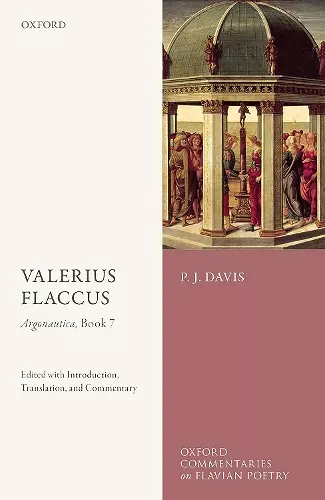Valerius Flaccus: Argonautica, Book 7
Edited with Introduction, Translation, and Commentary
Format:Hardback
Publisher:Oxford University Press
Published:2nd Apr '20
Currently unavailable, and unfortunately no date known when it will be back

The story of Jason and the Argonauts is one of the best known of ancient Greek myths and has captivated people for over two and a half thousand years. Focusing on Medea's attempts to resist her love for Jason, Book 7 of Valerius Flaccus' Argonautica presents one of the most attractive and engaging episodes in all of Greco-Roman epic: the key moment when Jason and Medea fall in love and when Jason, with Medea's help, yokes the king's fire-breathing bulls, sows the dragon's teeth, and compels the earthborn men to destroy themselves. Although versions of the story of the Argo's journey from Greece to the Black Sea had been told by many earlier poets, this Roman account of the myth differs from its predecessors in important ways. First, Valerius presents the Argo as the first ship and the voyage as a decisive turning point in human history: the Argo's breaking down of natural barriers will lead to interchange between human communities and to a sequence of empires, culminating of course in that of the Romans. Second, Valerius constantly foreshadows other parts of Medea's myth, most notably the explosion of violence in Corinth well known to Valerius' audience and to us from the Medea tragedies of Euripides and Seneca. Third, and most important, Valerius concentrates attention on the inner workings of Medea's mind as she fights against the combined efforts of two goddesses who ultimately compel her to betray her father and help Jason to win the golden fleece. This new edition of Argonautica 7 offers the first detailed commentary on this book of the poem in English, as well as a substantial introduction intended to be as accessible to as many readers as possible, a new Latin text, and a facing-page prose translation. The commentary is primarily literary, emphasizing Valerius' engagement with the epic tradition and with earlier treatments of the Medea story, as well as the elegance and power of his poetry, and is intended to be of use to scholars and students at all levels of study
While midlevel classes could certainly usefully draw on sections of the text, I would argue that this is really a commentary for advanced students and scholars...Davis's commentary will deeply enrich their encounter with the book. * Darcy A. Krasne, Classical Outlook *
Davis has written a first - rate commentary on a fascinating bit of epic narrative, making a valuable contribution to the growing body of work on the Flavian literary scene ... he has produced a piece of scholarship that will inspire still others to read this marvelous poem with the same kind of attention and creativity contained in this book. * Tim Stover, GNOMON *
The commentary is said to be "primarily literary" (dust jacket), but to this reader's delight, is also philological in the sense that it helps the reader parse the text and identify figures of prosody and rhetoric... Davis establishes his text by deftly steering between the Scylla of conservatism and the Charybdis of conjecturalism. * Alexander Andrée, Bryn Mawr Classical Review *
Davis writes inclusively, adopting an easy-going, expansive style * Christopher Whitton, Greece & Rome *
ISBN: 9780198767190
Dimensions: 242mm x 164mm x 24mm
Weight: 634g
312 pages